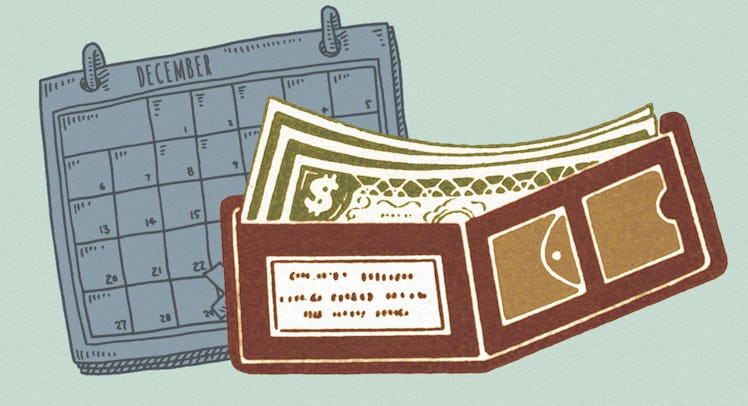5 Year-End Financial Tasks Every Parent Should Complete, According to a Financial Planner
Taking care of these five tasks now will help set you up for a stronger 2018.

Ready, steady, go. It’s the mad dash to the finish line and a time where we’re all trying to wrap things up before the ball drops on December 31st. If you’re like most people I know, getting your family finances is definitely one of those things you’re trying to squeeze in so that you can start 2018 off right. Rather than scramble around looking for a quick fix, simply take a deep breath and make sure to tick these items off your list to get your money situation squared away for the new year.
Identify, Quantify and Prioritize Your Goals
You can’t get anywhere before knowing where you want to go. So, before you can do anything, make sure you’re setting your goals. Seriously. If you went the entire year without establishing any concrete goals, can you really be that surprised you feel like you didn’t get anywhere? You shouldn’t be. Think about concrete goals. The most common ones I hear are paying off debt, building a cash reserve, making a down payment on a home, and saving for retirement. It’s your life and your family, so only you can decide what it is you want in this life. But, the sooner you figure this part out, the better off you’re going to be in the long run. Oh, and please: do yourself a favor and put them in writing.
Once you’ve got your goals listed, you’re going to need to quantify them by both time and value. For example, when do you want to make a down payment on a home and how much is that home going to cost? Do this for each one. Finally, rank your goals by most important to least important so you know exactly where your first and last dollar of savings is going to be allocated. Again, it’s important to remember that these are your goals and yours alone. Don’t worry about what your friends and siblings are doing. They aren’t you and they’re not living your life for you.
Look Back At Your Cash Flow
The end of the year is the ideal time to look back at what you’ve spent your money on. It’s not fun: I hate diving into these matters as well. But, the data and information you will gather from this exercise is critical.
Start out by gathering your credit card and bank statements from throughout the year. Then, start categorizing your spending into general categories. Once you’ve completed the exercise, take a minute to review exactly where your money went. Was this more than what you took in? That means you may have taken on debt when you should be trying to save. Were there any categories where you spent too much? Look at them and make a goal to try and spend less there this coming year so you can allocate more savings towards your goals. Lastly, from the data, you can now create a realistic budget for the year ahead.
Take A Good Look At Your Emergency Fund
Did an unexpected repair or trip to the doctor set you back this year? I hate it when that happens, which is why you should consider making a cash reserve a part of your 2018 agenda. I’m a firm believer that when we feel more comfortable and confident we tend to become better, more productive versions of ourselves. This might be an unpopular opinion but even if it’s at the expense of some of your longer-term goals, like retirement savings, it makes sense to allocate some savings towards the emergency fund.
Button Up Your Insurance and Estate Planning
Speaking of being comfortable, having adequate insurance and a basic estate plan are essential components to a strong financial foundation and to sleeping well at night. If you haven’t taken care of these items yet, please make a promise to yourself and to the ones you love that you will take care of it before the year comes to an end. You can check out my No Bullshit Guide to Buying Your First Life Insurance Policy for help. As for the estate planning side of things, make an appointment with a trust and estates attorney to draft wills, powers of attorney, and medical directives for you and your significant other. As morbid and depressing as this all might sound, it’s the stuff of which sound sleep is made.
Think About Possible Investments
Before you even consider taking on any risk with your money, ask yourself, “Have I earned the right to invest?” This means that you’ve first taken care of everything we’ve just laid out. Don’t be in a hurry here. Odds are that you have many short-term goals that are going to require cash savings, which takes investing off the table anyway. If you think you’re missing out, you’re not. Let that annoying colleague tell you about that winner stock he bought. They probably have no idea what they are doing. The basic guiding principles I’ve outlined above are far more important than diving head first into the market. Plus, there’s no such thing as a quick buck when you’re not ready. Don’t worry, you’re going to get there and the sooner you take care of these review items, the sooner you will have earned the right to do so.
Douglas A. Boneparth is NYC’s Financial Advisor for Millennials. He’s the co-author of The Millennial Money Fix and the CFP Board Ambassador for New York.
This article was originally published on